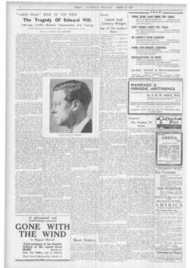Page 8, 19th March 1937
Page 8

Report an error
Noticed an error on this page?If you've noticed an error in this article please click here to report it.
Tags
Share
Related articles
Workers Return To Churcii1 In Barcelona Aylesford...
Vatican Press And Belgium Catholic Split : General Spirit...
Europe's Seminarians Seek To Bend It Like Beckham
The Belgian Situation " Our Correspondent " Supported
Belgium Finds A Leader
A Political Duel
Belgium is preparing for the most spectacular and picturesque political contest since the war.
Like a knight in some mediaeval tournament, serious-minded, cau tious, philosophic, experienced Van Zeeland, Prime Minister and head of the " Catholic " Party, has picked up the gage thrown at him by the young, enthusiastic Degrelle, founder and leader of the Rexists.
For the sake of the causes which they represent these men are to engage in single combat, while Belgium and the world watches, well aware that on the 'result depends not only the future government of Belgium but, to some extent, the issue between Parlia mentarianism and Authoritarianism. It is well to note that, despite the profound political and economic differences between the two cham pions, both are Catholic—a striking refutation of the view that Catholics must take their politics from Rome and take " reactionary " politics at that. As it happens, the weight of Belgian Catholic opinion, led by her hierarchy, is undoubtedly on the side of the champion of Parliamentarian ism. Degrelle, however, claims that he is himself a devoted Catholic, that the policy for which he stands is politically and economically more consonant with the trend of the Church's teaching, and that Belgian Catholics have not been forbidden to support him.
It will be noted that we have not said that Van Zeeland stands for democracy while Degrelle stands for the opposite. In view of the way in which the true spirit of democracy —the spirit that ensures that each and every man, made fully aware of what is entailed by his being a free, responsible human being in so far equal to any of his fellows, shall count and have his say in the nature and direction of his commonwealth— has been betrayed since the war by regimes, whether parliamentary or not, we refuse to state a priori that Van Zeeland is necessarily more of a champion of democracy than Degrelle.
It is for example the view of many Belgians that, because the very nature of Van Zeeland's cause entails his fighting with the support of Socialists and Communists, his victory will really mean the victory not of honest Parliamentarians, but of his unwelcome supporters who sooner or later will abandon him and force on Belgium a Socialist-Communist regime whose spirit will be wholly antidemocratic.
On the other hand there is perhaps even less prospect of Degrelle, if he ever gains power, avoiding the dangers of a totalitarian rule which will brook no sort of inconvenient opposition, even though that opposition be in favour of the genuine moral and religious rights of the ruled. We certainly cannot have any great confidence in the present declarations of Catholic Degrelle, for his future policy will not depend upon his present views, but on his future needs in order to mainstain himself in power.
It is indeed a difficult decision that the electors in Brussels will shortly have to make, and it illustrates very well the difficulty of the Catholic position in politics all over the world today. Shall we side with a Parliamentarianism which is ultimately based on the false philosophy that a majority composed of Men of all moral views or none is necessarily right, in order to safeguard the relative freedom of the Christian citizen, or shall we risk accepting an order imposed from above, in the hope that the one strong man may be sufficiently enlightened to realise that no ultimate good can come from an order that is not according to the Divine and Natural law?
The painful dilemma necessarily imposes itself on Christians whose fate it is to live in a world the springs of whose action is not Christian and often not even in accordance with natural morality. It is at bottom insoluble because both alternatives repose upon a false reading of reality.
Meanwhile, in regard to Belgium's own problem, every Catholic will seriously reflect upon the fact that the Hierachy of that country have up till now made no uncertain decision in favour of Van Zeeland.
blog comments powered by Disqus

















